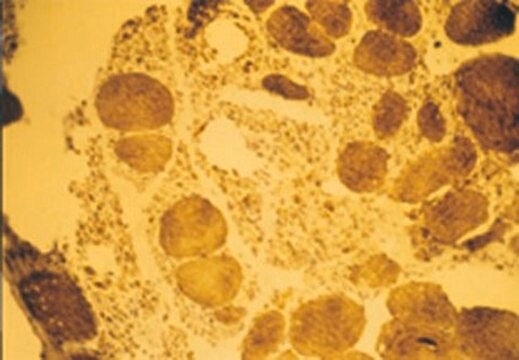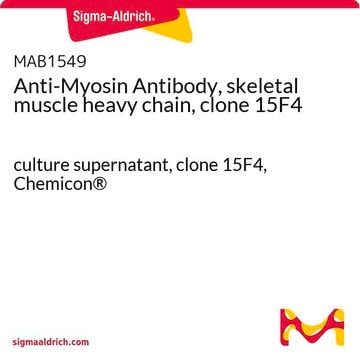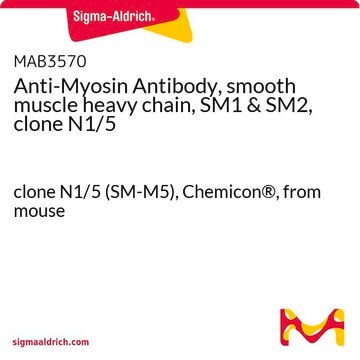SAB4200670
Anti-Myosin (Skeletal, Slow) antibody, Mouse monoclonal
clone NOQ7.5.4D, purified from hybridoma cell culture
Sinónimos:
Monoclonal Anti-Myosin (Skeletal, Slow) antibody produced in mouse, CMD1S, CMH1, MPD1, MYHCB, SPMD, SPMM
About This Item
Productos recomendados
biological source
mouse
Quality Level
antibody form
purified from hybridoma cell culture
antibody product type
primary antibodies
clone
NOQ7.5.4D, monoclonal
form
buffered aqueous solution
species reactivity
sheep, goat, chicken, feline, guinea pig, pig, rabbit, hamster, canine, rat, human, mouse, bovine
packaging
antibody small pack of 25 μL
concentration
~1 mg/mL
technique(s)
immunoblotting: 1.25-2.5 μg/mL using Rat skeletal muscle lysate.
immunohistochemistry: 2.5-5 μg/mL using pronase digested, formalin-fixed, paraffin-embedded rabbit tongue/leg sections and Biotin/ExtrAvidin®-Peroxidase staining system.
isotype
IgG1
shipped in
dry ice
storage temp.
−20°C
target post-translational modification
unmodified
Gene Information
human ... MYH7(4625)
General description
Immunogen
Application
Biochem/physiol Actions
Physical form
Legal Information
Disclaimer
¿No encuentra el producto adecuado?
Pruebe nuestro Herramienta de selección de productos.
Storage Class
12 - Non Combustible Liquids
wgk_germany
WGK 1
flash_point_f
Not applicable
flash_point_c
Not applicable
Certificados de análisis (COA)
Busque Certificados de análisis (COA) introduciendo el número de lote del producto. Los números de lote se encuentran en la etiqueta del producto después de las palabras «Lot» o «Batch»
¿Ya tiene este producto?
Encuentre la documentación para los productos que ha comprado recientemente en la Biblioteca de documentos.
Los clientes también vieron
Nuestro equipo de científicos tiene experiencia en todas las áreas de investigación: Ciencias de la vida, Ciencia de los materiales, Síntesis química, Cromatografía, Analítica y muchas otras.
Póngase en contacto con el Servicio técnico













